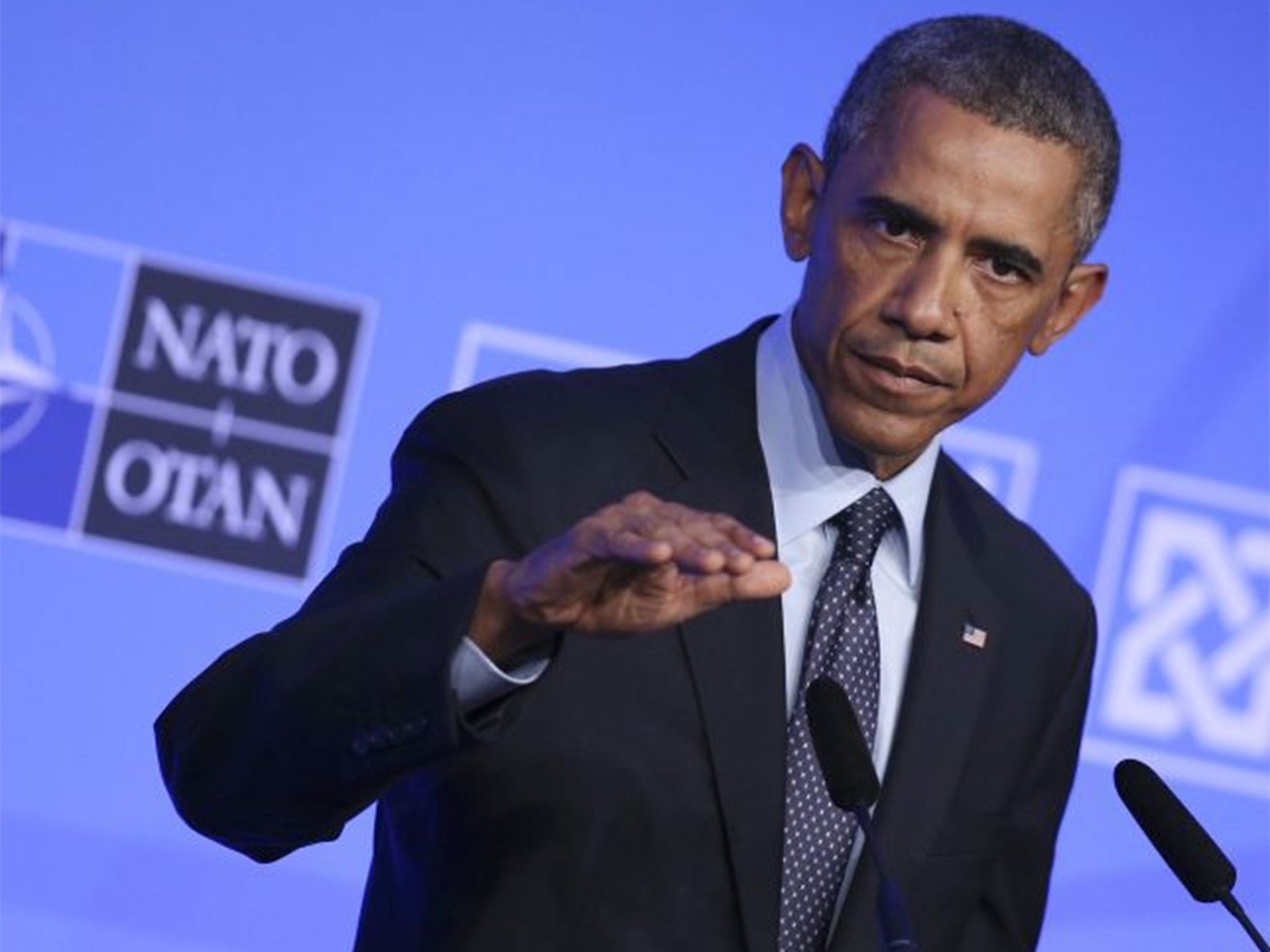Islamic State: Britain joins coalition to 'destroy' Isis – but battle could take three years, warns Obama
Nato council of war pledges to act to destroy jihadist organisation

Your support helps us to tell the story
From reproductive rights to climate change to Big Tech, The Independent is on the ground when the story is developing. Whether it's investigating the financials of Elon Musk's pro-Trump PAC or producing our latest documentary, 'The A Word', which shines a light on the American women fighting for reproductive rights, we know how important it is to parse out the facts from the messaging.
At such a critical moment in US history, we need reporters on the ground. Your donation allows us to keep sending journalists to speak to both sides of the story.
The Independent is trusted by Americans across the entire political spectrum. And unlike many other quality news outlets, we choose not to lock Americans out of our reporting and analysis with paywalls. We believe quality journalism should be available to everyone, paid for by those who can afford it.
Your support makes all the difference.The struggle to “destroy” jihadist fighters sweeping across the Middle East could last three years, the United States has warned as it sought to assemble a “core coalition” to confront Islamic State (Isis) forces.
Britain was among 10 nations which pledged to dedicate themselves to exerting political influence, economic pressure and military power to drive Isis out of existence during a “council of war” at the Nato summit in South Wales.
Later President Barack Obama said the 28 Nato members unanimously agreed on the need for immediate action against Isis, which he denounced as a “savage organisation” that had to be obliterated.
Nato leaders spelt out the scale of the task ahead in confronting Isis forces in Syria and northern Iraq, as well as reinforcing Kurdish and Iraqi forces resisting the militants’s advance.
The US Secretary of State John Kerry warned it could take three years to eradicate Isis. David Cameron refused to put a timescale on the operation, but said the world faced a “generational struggle” against extremist ideology.
The “core coalition” meeting was attended by the United States, Britain, Germany, France, Italy, Turkey, Australia, Canada, Poland and Demark.
British sources indicated that the Government – which was represented at the meeting by the Foreign Secretary, Philip Hammond – was committed to the principle of Nato members joining forces to tackle the jihadi threat.
But they are anxious to avoid the suggestion of western nations acting alone in the Middle East, which would have uncomfortable echoes of the Iraq war in 2003, and insist there should be strong regional support for action against Isis.
Mr Kerry said: “We need to attack them in ways that prevent them from taking over territory, to bolster the Iraqi security forces and others in the region who are prepared to take them on, without committing troops of our own.”
He added: "We're convinced in the days ahead we have the ability to destroy [Isis]. It may take a year, it may take two years, it may take three years. But we are determined.”
Although the White House has not formally asked any other countries to support join US-led bombing raids on Isis positions, the path to potential military action began to emerge at the South Wales summit.
Nato leaders are setting great store on the establishment of a non-sectarian, stable government in Baghdad. It is scheduled to be formed by next Friday, but it could take several weeks to agree its policies and exact composition.
At this point Nato believes it can begin supplying military equipment to Baghdad as well as arms to Kurdish forces.
Mr Kerry is also calling for agreement on an international plan for combating Isis by the time of the general meeting United Nations General Assembly in New York later this month.
Some of the countries contemplating military action could have to receive approval from their parliaments. In Britain’s case, this could not happen until mid-October following the party conference season.
In some of his toughest comments since Washington began air strikes last month, Mr Obama spelt out his determination to obliterate Isis.
"We are going to achieve our goal. We are going to degrade and ultimately defeat ISIL, the same way that we have gone after al Qaeda,” he told his end-of-summit press conference.
Mr Cameron told reporters that action against Isis would require “time and resolve”. He said: "I wouldn’t want to put a timescale on that, but I have said many times this is a generational struggle.”
He called for a “mixture of intelligent politics, diplomatic pressure, long-term engagement in a comprehensive plan as well as the potential for military or other more aggressive action”.
Michael Fallon, the Defence Secretary, said the struggle against the Islamic State would take "months and possibly years" and could not be resolved simply by swift air strikes.
Asked how Britain would respond to a request for air strikes against IS forces from the new Iraqi government expected to be formed in the next few days, Mr Fallon told BBC News: "Each country will have to respond and parliaments across Nato will have to come to their own decisions as to whether they are prepared to get behind military action to halt the advance of Isil.
"Air strikes alone aren't going to defeat Isil. This has to be done on a much broader scale, it has to involve all of us in the alliance standing together, it has to involve other countries in the Middle East, and it's an engagement that is going to take months and possibly years.
Join our commenting forum
Join thought-provoking conversations, follow other Independent readers and see their replies
Comments